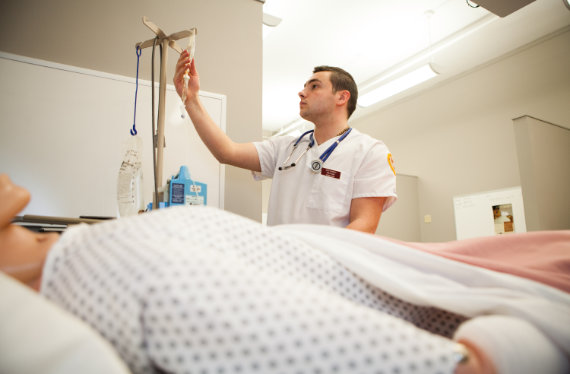If you’re on this page, you’re most likely a military veteran who is interested in becoming a nurse. That’s great! Many veterans choose to enter the field of nursing, whether they come from a medic/corpsman experience or not.
However, returning to the civilian workforce has its challenges. In order to become a registered nurse (RN), you’ll need to earn at least an associate’s degree in nursing. That being said, many states now require registered nurses to hold at least a bachelor’s degree from an accredited college or university, and even in states where this isn’t a requirement, many employers specifically prefer those who have completed their Bachelor of Science in Nursing (BSN).
With this in mind, if you’re interested in a career in nursing, it’s typically recommended that you earn your BSN before looking to enter the nursing workforce. But how would you even get started on a BSN? What kind of program should you be looking for? And how should you best prepare?
What To Look For in a BSN Program
The first step to pursuing a nursing career is to find a BSN program that you feel good about applying to. In order to do that, there are a few key considerations you will want to take into account first..
1. Compare the Programs you’re Considering Against Peer Institutions
Different students look for different things when they’re applying to colleges and universities. For example, some might consider the size of the school important, or whether or not there is one-on-one support available. Others might be looking for specific employment opportunities or program specialities in certain medical areas. When evaluating the options available to you, make sure to identify the most important factors to you and use those to guide your search.
One of the factors you may want to consider when evaluating your options is the amount of financial aid available to veterans. If you’re applying to a private institution, for instance, you should consider whether it is a Yellow Ribbon school. Yellow Ribbon schools help cover the tuition expenses veteran students incur if the GI Bill® is insufficient to cover the total amount, so you may want to put looking for a school that offers Yellow Ribbon benefits high on your priority list.
2. Compare the Pass Rates for the NCLEX
Obtaining your BSN is only the first step to becoming a registered nurse. In order to become a nurse, you’ll need to pass the NCLEX exam after earning your degree. This exam will test your knowledge of the nursing field and is a requirement for obtaining licensure as a nurse.
All BSN programs should have data about their NCLEX pass rates available on their website or sent to you if asked. It goes without saying that a high pass rate is favorable as it points to a quality program that prepares its students well for not only the NCLEX but their careers in nursing.
3. Compare the Curricula.
The program curriculum is what you’ll ultimately be paying for, so be sure to know how the different BSN programs vary in this regard. For example, what specific courses will you be required to take in each program? What electives are available, and do these align with your interests? Does the curriculum highlight your strengths, and is there proper opportunity to work on your weaknesses? Ask yourself these important questions to see which program curricula would be best for your needs.
4. Compare Requirements for Clinical Hours
Each BSN program will come with a requirement to fulfill clinical hours in order to graduate. Accordingly, you’ll need to understand what each program requires in terms of clinical hours and if this aligns with your expectations. You don’t want to commit to a program and then be overwhelmed – or underwhelmed – with the amount of hours you’re required to fill.
5. Compare Veteran Support Systems
In line with Yellow Ribbon Schools that we discussed above, some BSN programs may have more veteran support systems than programs from other schools. And while support from the school is also important, you really want to look into support from fellow students as well. For example, what kind of study groups or student groups are available on campus for veterans – and really, nurses – specifically? Is there a student organization that could serve as a good support system? These are important things to consider as you research potential BSN programs.
Application Tips
Now that we’ve discussed how to identify the best BSN program for you, let’s dive into some tips for when you’re ready to actually start applying.
1. Avoid Military Jargon
If you’ve lived and breathed the military for years, this will be a tough one, but it’s equally as important. In writing a cover letter, application letter, or application for colleges, do your best to “demilitarize” your language so you’re not using too much military jargon. You need to be able to explain your experiences and skills in a way that someone who has never been in the military will be able to understand.
2. Self-Evaluate your Math and Science Skills, and Study Accordingly
As you know, nursing will require a certain level of math and science knowledge. If you’re concerned about this, trust us – you’re not alone.
If you need to brush up on some math and science before enrolling in a program, consider taking one or two refresher or prep courses on your own. Another good way to prepare for applications and also show interest in a program (which puts you ahead in the application process) is to ask a member of the school’s enrollment team whether they have courses you can take to improve your skills. This is a great way to demonstrate interest as well as make sure that your math and science are up-to-date for the BSN programs you’re interested in.
3. Understand your Goals
Applying to BSN programs requires you to understand your own goals, so that you can find the program that is the best fit for you. You may want to ask yourself:
- What are my long-term career goals?
- What do I want to achieve by completing this degree?
- What are my personal strengths that I can lean into?
- What are my personal weaknesses that I want to improve?
As you answer these questions, you’ll not only find the programs that best align to your goals, but you will also find that admission committees will better recognize the value you will add to the school through your application.
Getting the Most Out of Your Degree
With your BSN degree, you’ll be able to enter the workforce as a proud registered nurse and begin your new career. Along the way, you’ll also have learned a great deal, as well as nurtured some lifelong relationships and friendships with fellow nurses and veterans through a great support system.
For more information and tips about a nursing career, check out “Transitioning from Military Medic/Corpsman to Nurse: A Complete Guide.” Here at Regis, we continue to offer our support as an educational partner for aspiring veteran nurses. Best of luck!
GI Bill® is a registered trademark of the U.S. Department of Veterans Affairs (VA). More information about education benefits offered by VA is available at the official U.S. government website.




